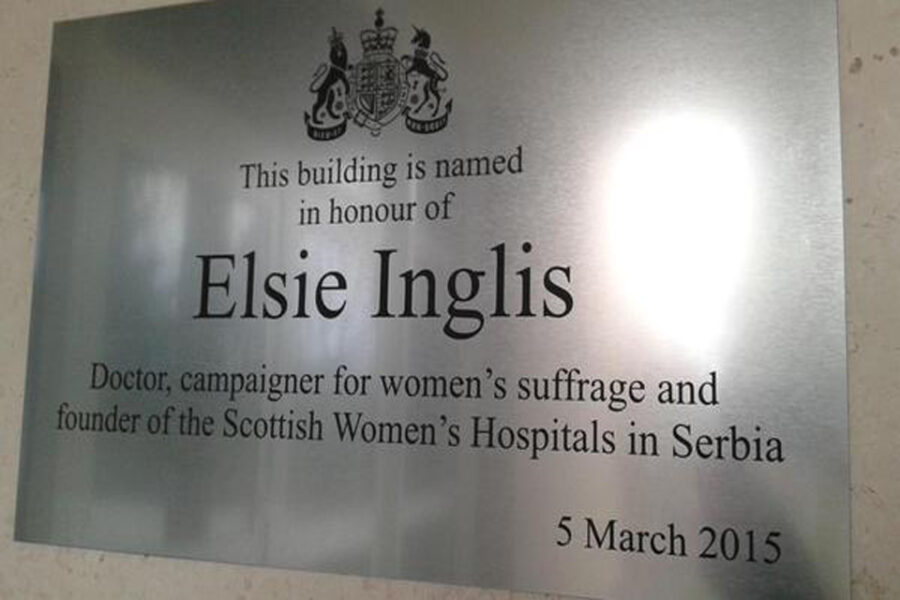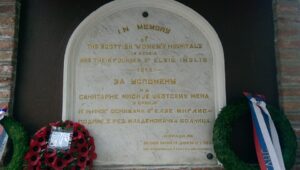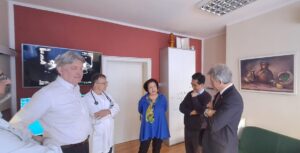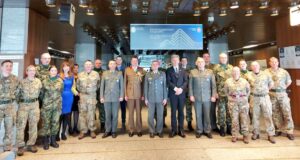9th April 2025 Belgrade, Serbia
The UK and Serbia: saving lives together

Zdravo! The Serbian word for ‘hello’ or ‘hi’ actually means that you wish someone good health. We all want good health for ourselves, our family and our friends. In almost every country in the world, the economy and healthcare are consistently the two issues that matter most to citizens. But did you know about the close links between the UK and Serbia in healthcare and medicine?
The story starts during the First World War. Serbia’s heroic resistance to Austro-Hungarian attacks in 1915 inspired the British people, while the news of a brutal typhus epidemic that would kill at least 160,000 people aroused public sympathy. Huge sums of money were donated to the Serbian Relief Fund which were used to pay for hospitals across Serbia. Dr William Hunter pioneered new disinfection methods, including the so-called Serbian barrel, to restrict the spread of the disease. Hundreds of British volunteers – most of them Scottish women – rushed to Serbia as doctors, nurses, ambulance drivers and orderlies, unselfishly risking their lives to save thousands of others. Some died alongside their patients and are buried here. I recently attended to mark the 110th anniversary of the death from typhus of Dr Elizabeth Ross. Similar ceremonies take place every year in Mladenovac, Leskovac, Bajina Bašta and Vranje. Serbia does not forget those who offered help in dark days.

The story continued through the Second World War. The Royal Air Force formed a special formation of Yugoslav personnel, the Balkan Air Force, which played a key role in evacuating casualties. As the former Partisan colonel, Vladimir Dedijer, would later write, “The taking of the wounded to Italy represented the greatest aid which we received from the allies during the war. This not only meant saving the lives of our wounded comrades, but also the unburdening of our units, which became far more mobile.”
Medical contacts continued in peacetime when, in 1945, a group of British plastic surgeons and anaesthesiologists arrived in Belgrade to help treat the many military veterans and civilians who had suffered deformity during the war. The first team was led by Dr Patrick Shackleton, who was followed in May 1946 by Dr Russell Davis. These two men can rightfully be seen as the founders of modern anaesthesia in the former Yugoslavia. A year after their departure from Belgrade, anaesthesiology was recognised as an independent sub-specialty branch, and in 1948 the first specialist exams were held. Shackleton and Davis would later inspire the establishment of the Yugoslav Association of Anaesthesiologists when they met 26 Yugoslav colleagues at the 4th World Congress of Anaesthesiologists in London in 1968. Their legacy can be viewed in the extraordinary work which anaesthesiologists do every day here in Belgrade and in hospitals across Serbia to alleviate pain and save lives.
Today, in 2025, medical cooperation between Britain and Serbia takes many forms. My daughter recently had a minor operation at the Institute of Mother and Child. Both her surgeon and her anaesthesiologist had trained at Great Ormond Street Hospital (GOSH) in London, arguably the world’s most famous paediatric hospital. They are testament to the extraordinary, nearly 40-year-long cooperation between GOSH and the Institute, for which Dr Mila Stajević has been the inspiring catalyst and leader. Last year, I met two leading British surgeons from GOSH who had travelled to Belgrade to perform complex paediatric cardio surgery. This is a partnership that saves lives.

The British-Serbian Medical Association does a fantastic job of connecting medical professionals from both our countries and providing bursaries to enable travel to the UK to attend courses and seminars. I keep discovering eminent physicians of Serbian origin in the UK, who are at the peak of their profession. And there are regular visits to Serbia by British medical professionals, to share experience with their counterparts here. One example is the colorectal surgical conference which takes place every two years in Pančevo, just across the Danube. The relationships that have been built with UK colleagues in this field have led to the Serbian laparoscopic training programme being set up to mirror the very successful UK training scheme.
I’m also very pleased that, 110 years after the first British doctors and nurses arrived in the midst of the Serbian typhus epidemic, our partnership on military medicine is alive and well. This week, Major General Tim Hodgetts, the former Surgeon General in the UK Armed Forces, will visit Serbia to deliver a lecture at Military Medical Academy, where he is a visiting Fellow. Two UK military medical delegations have visited Serbia in the past year for training in specialisms from war surgery and toxicology to anaesthesia. Our Serbian friends have also been regular visitors to the UK, with Serbian nurses attending the annual Florence Nightingale Commemoration Service at St Paul’s Cathedral, while Serbian military medics achieved a remarkable second place at an international military skills competition, beating even their British hosts!

Finally, a word on medicines. AstraZeneca is the largest company listed on the London Stock Exchange. In various forms, they have actually had a presence in Belgrade since 1978, the year I was born. For 47 years, they have helped to save lives, and to improve the quality of life, for many thousands of people in Serbia. I’m especially proud that, during the COVID pandemic, unlike other providers, AstraZeneca sold its vaccine to Serbia, and around the world, on a not-for-profit basis. So I was really delighted, during the visit to Serbia earlier this month of David Lammy, the UK Foreign Secretary, that President Vucic announced plans to add new, world-leading medicines from AstraZeneca to the reimbursement list for the National Health Insurance Fund. I hope this will make a huge and positive difference for Serbian patients, and for their families.
I’m writing this blog in Elsie Inglis House. The name of the British Ambassador’s Residence in Belgrade is named after the Scottish surgeon who founded 14 hospitals in Serbia during the First World War. I hope that she will soon become the first woman to be honoured with a bronze statue in the centre of Edinburgh, her home town. What a wonderful tribute that will be to this extraordinary partnership in health and medicine – over 100 years old, and still saving lives today.
Neka smo živi i zdravi.